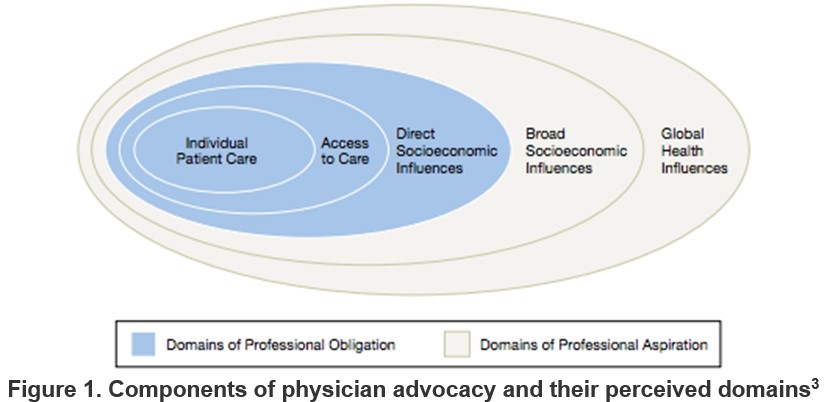How does a doctor best act as an advocate for their patients?
Name: Shayna Taryn Vedica Henry
Year of Study: Graduate Entry Medicine Year 3
Medical School: University College Cork
Email address: [email protected]
[spacer height="20"]
[spacer height="20"]
Shayna Henry is a third year medical student in the graduate entry program at University College Cork. Prior to starting medicine, she completed an Honours B.Sc in Biology, as well as an M.Sc in Global Health at McMaster University in Canada. Following the completion of her M.Sc degree, Shayna worked on an HIV and infant feeding campaign with the international advocacy organization, AIDS-Free World. During this time, her passion for advocacy grew substantially. She plans on pursuing a career in family medicine with a focus on global health, advocacy, and health policy. Currently, she is the student representative of the Irish Forum for Global Health at University College Cork.
[spacer height="20"]

The role of Advocate is one of the core responsibilities of medical professionals in all areas of medicine. Advocacy has been established as an essential part of patient care, supported by the mandates of several professional bodies. Advocating for patients at an individual level is commonly accepted as being part of a physician’s professional obligation and duty of care. However, in order to best act as an advocate for their patients, physicians must look past beyond this and engage in advocacy activities that reach a larger population. This can be accomplished through the knowledge translation process, which emphasizes the synthesis, exchange, and application of knowledge. In doing so, physicians are able to care for their patients at an individual level, as well as advocate for their health from a population level.
At the individual level, doctors are constantly advocating for their patients. With more experience, this becomes so integral to day-to-day activities, that it is almost second nature. Advocacy is an inherent part of the role of a physician, and it is something that is often taught in medical school. The importance of patient education, how to get that urgent referral, and even how to advocate for the coverage of expensive medicines, are all topics discussed throughout medical school. However, what is often not discussed is the unique and privileged position that doctors have, and how this position is perfectly poised to influence policy change.
Advocacy is a central part of the expectations of medical trainees and professionals. Several international medical organizations emphasize this aspect of professional responsibility among their members. Canada, for example, follows the CanMEDS framework, established by the Royal College. CanMEDS defines Health Advocates as those who work with those they serve to determine and understand needs, speak on behalf of others when required, and support the mobilization of resources to effect change.1
The Irish Medical Organization also describes the Doctor as Advocate in their Role of the Doctors Series. Here, advocacy is described as playing a “significant role in medical professional life in Ireland, from patient advocacy through to more public advocacy roles.” This document also suggests that advocacy as a physician encompasses individual patient care as well as lobbying for resources and services at a broader level, and for specific patient groups.2
The positions of these two professional bodies support the notion that, as an advocate, the health advocate role includes more than just advocacy at the individual patient level. However, as Gruen et al point out, professional responsibility along this spectrum can be perceived as obligation or aspiration.3 The image below depicts the various aspects of advocacy mentioned above. More importantly, it indicates the two domains under which medical professionals may perceive them: professional obligation and professional aspiration. This figure suggests that, although advocacy encompasses activities from individual patient care to population level care, the broader aspects of this responsibility are deemed to be outside of the domains of professional obligation. This includes efforts to influence policy through broad socioeconomic and global health influences. In order to best advocate for their patients, physicians must extend the reach of their advocacy initiatives and delve into the domain of professional aspiration.

The knowledge translation process is a framework that can be used to achieve these broad socioeconomic and global health influences. The WHO defines knowledge translation as the “synthesis, exchange, and application of knowledge by relevant stakeholders to accelerate the benefits of global and local innovation in strengthening health systems and improving people’s health.”4 By engaging with this process, physicians are best able to advocate for their patients.
The synthesis of knowledge through research is one of several ways doctors can broaden the scope of their advocacy efforts, and best advocate for their patients. Research is the foundation of evidence-based guidelines that inform clinical practice. It is this evidence, combined with clinical experience, which guides the decision making process to provide the best patient care. This evidence also provides grounds on which physicians can advocate for better care of their patients.
There are several ways in which medical professionals can engage with the synthesis of knowledge. Direct involvement in research projects contributes to the general knowledge base of the medical profession. By generating and disseminating knowledge, physicians are effectively extending the reach of their advocacy work by empowering others with the knowledge required to be strong advocates.
In addition, physicians are engaging with the synthesis of knowledge by remaining up to date with current research in their selected field of medicine. This ensures that they are best able to care for their patients, and have the knowledge to advocate for them when necessary. This also encourages physicians to critique our current knowledge base, and identify research questions that fill the gaps in our knowledge.
The exchange of knowledge is also a critical component in the knowledge translation process. Without effective knowledge exchange, new and innovative research findings would be disseminated slowly, and progress in health care would stagnate. Knowledge exchange encourages physicians to collaborate on key issues, and identify areas for change. It also sheds light on prevalent issues that otherwise may go unnoticed. It brings together those with similar interests, and creates an environment that inspires people to incite change through policy. Knowledge exchange contributes to advocacy by informing efforts to create sustainable, equitable health policy.
Knowledge exchange can occur in a various ways, ranging from informal journal clubs and newsletters, to large international conferences. Each individual physician can engage in this process as they so choose, but it is important that they engage in some way.
The application of knowledge is the final piece of the knowledge translation process. The application of evidence generated by research and obtained through knowledge exchange is how physicians treat and advocate for their patients at the most basic level. However, in order to best advocate for their patients, it is imperative that doctors engage in knowledge application at a higher level, through health policy involvement. Engagement in policy making can occur at various stages in the cycle: policy creation, policy implementation, and policy review.
Medical professionals are uniquely positioned to inform changes in health policy. Every patient interaction has been influenced by current health policy. Given their intimate relationship with the outcomes of health policy, it is reasonable to understand why physicians could meaningfully contribute to the policy making process. However, this is not always the case. Although it is widely accepted that they are key stakeholders to engage in the health policy process, it is often difficult to involve this group of professionals.5 However, it is critical to recognize that involvement in policy change does not only occur through large campaigns and lobbying efforts. It can also occur through feedback to hospital management, and discussions with local government representatives. In order to best advocate for their patients, physicians must actively engage in the policy making process, at any level, and advocate for the needs of their patients in the political arena.
The implementation of policy challenges whether the research and theory behind the policy can withstand the test of reality. Again, physicians occupy the ideal position to observe the effects of these policies, and identify factors that contribute to or hinder their success. However, in order to make these observations, doctors must be aware of changes in health policy, and implement new policies when necessary. The field of medicine is constantly changing, and a career in medicine entails lifelong learning. Part of this involves staying up to date with changes in your field, and staying abreast of the most recent changes in relevant policy.
Finally, the review process allows for monitoring and evaluation of new policy.
Here, newly implemented policies are scrutinized, and adjustments are made if necessary. Physicians are constantly reviewing health policy, simply by experiencing their effects and the outcomes that they generate. However, this review process, and professional opinion on health policy, is not always shared publicly. In order to best advocate for their patients, physicians must openly review and criticize policies that fail, and support those that are successful. This encourages policymakers to learn from their mistakes, and work to repeat their successes. By actively and openly reviewing health policy, doctors have the opportunity to advocate for a larger patient population, and impact many more patients that just those in their own clinics.
It is becoming increasingly clear that physicians are a key population to engage when enacting health policy change. Physicians have the privilege, the insight, and the duty to advocate for those who cannot advocate for themselves. In order to best accomplish this, it is critical that they become more involved in the health policy process. This can be achieved through engaging with knowledge translation. Doctors must begin to look beyond the confines of their limited patient population, and address the needs of those who may not make it in through their office door. The purpose of this article is to encourage physicians to see the value in advocacy activities, large and small, and to reconnect with the advocates in themselves. Look beyond what is commonly accepted as professional obligation, and aspire towards creating widespread change, that will inevitably have a positive impact on your own patient population.
References
1. Royal College of Physicians and Surgeons of Canada. CanMEDS – CanMEDS Framework - Health Adovcate [Internet]. Location: Ottawa; 2015. Available from: http://www.royalcollege.ca/rcsite/canmeds/framework/canmeds-role-health-advocate-e
2. Irish Medical Organisation. IMO Role of the Doctor Series – The Doctor as Advocate [Internet]. Location: Dublin; 2013. Available from: https://www.imo.ie/policy-international-affair/overview/IMO-Position-Paper-on-the-Doctor-as-Advocate.pdf
3. Gruen RL, Pearson SD, Brennan TA. Physician-citizens—public roles and professional obligations. Jama. 2004 Jan 7;291(1):94-8.
4. World Health Organization. Ageing and life-course – Knowledge Translation [Internet]. Location: Geneva; 2012. Available from: http://www.who.int/ageing/projects/knowledge_translation/en/
5. Lee, TH., Cosgrove, T. Engaging Doctors in the Health Care Revolution. Harvard Business Review [Internet]. 2014 June [cited 2018 March 30]. Section: [Health]. Available from: https://hbr.org/2014/06/engaging-doctors-in-the-health-care-revolution
